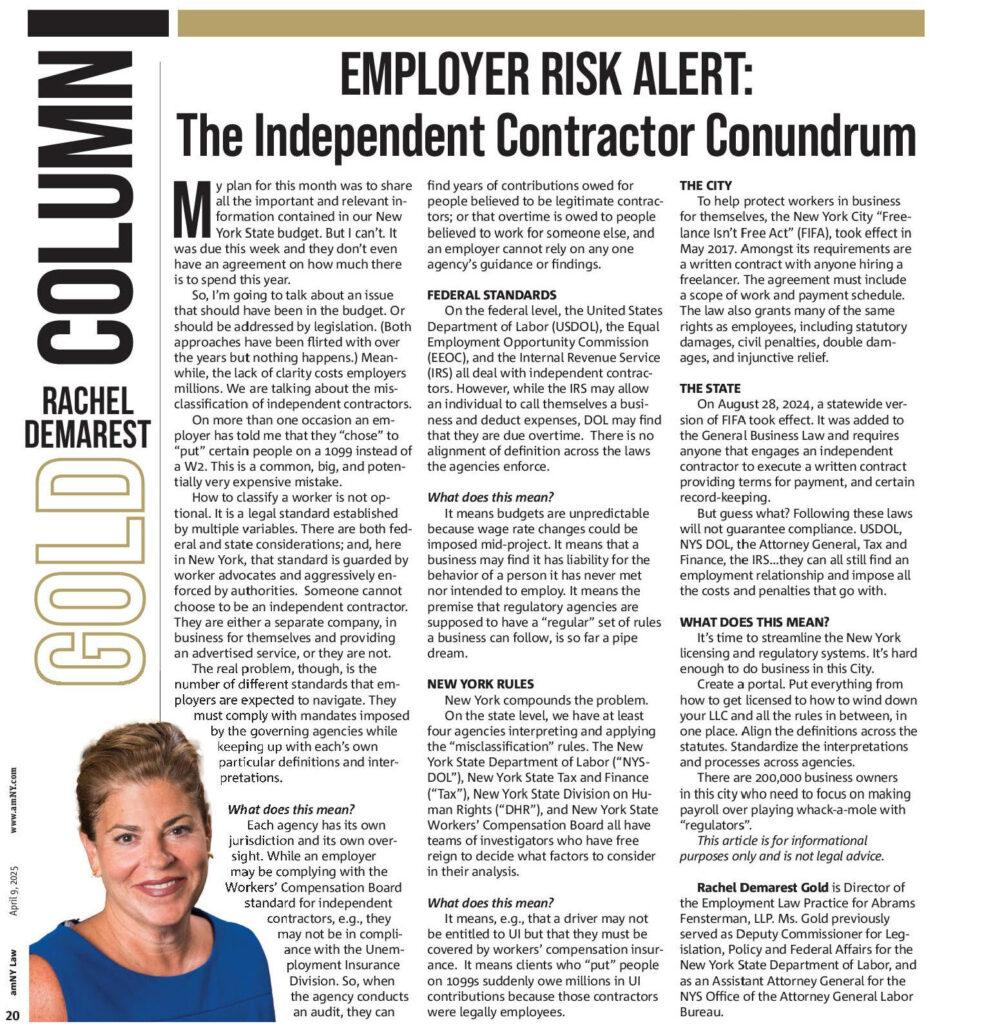By Jeff Overley
Law360 (November 15, 2019, 7:01 PM EST) — The U.S. Department of Justice‘s controversial crusade against disfavored False Claims Act suits appears to be on increasingly solid ground after a series of court decisions allowing the DOJ to end whistleblower FCA cases. Here, Law360 spotlights five key takeaways from the government’s recent success.
‘Tide is Turning’ in DOJ’s Favor
The trend of triumphs for the DOJ was hammered home by three decisions on the same day earlier this month. The decisions on Nov. 5 by federal judges in California, Pennsylvania and Washington state granted DOJ motions to dismiss fraud allegations targeting AstraZeneca PLC, Gilead Sciences Inc. and a UnitedHealth Group Inc. unit despite opposition from FCA whistleblowers.
“I do think the tide is turning in favor of the government’s dismissal authority, and these three recent cases all support that premise,” Kenneth Abell, an ex-DOJ litigator now at Abrams Fensterman Fensterman Eisman Formato Ferrara Wolf & Carone LLP, told Law360.
The DOJ sought to dismiss the three cases in accordance with its so-called Granston memo, a January 2018 directive aimed at weeding out FCA suits that conflict with government prerogatives. As of October, the DOJ said it had sought dismissal in about 36 cases since the memo emerged. Department officials this week didn’t provide a full list of those cases despite multiple requests from Law360.
Early in its campaign, the DOJ surprisingly saw two of its motions to dismiss rejected, sparking questions about its ability to control FCA cases, which are brought on behalf of the federal government and taxpayers. But the DOJ has bounced back in a big way, and while the U.S. Supreme Court may ultimately choose to set clear rules of the road, the government’s dismissal power in FCA cases appears destined to wind up somewhere between very strong and virtually invincible.
Only two of the DOJ’s approximately 36 motions to dismiss have been denied. Most of the remaining motions have been granted, led to cases being dropped voluntarily or remain pending.
‘New Risk’ Clear for Whistleblowers’ Lawyers
Whistleblowers typically file more than 600 FCA cases every year, and so the 36 dismissals sought by the DOJ barely put a dent in the FCA caseload.
But not every FCA case is created equal. In its motions to dismiss, the government has taken aim at fraud suits against a number of huge companies, including defense giant Raytheon Co. and banking behemoth JP Morgan Chase & Co.
Last year, the government found itself accused of “a disturbing alignment with Big Pharma” when it asked courts across the country to end a dozen FCA cases involving major drugmakers, including AbbVie Inc., Amgen Inc., Bayer Corp., Biogen Inc., Eli Lilly & Co. and Teva Pharmaceuticals USA Inc.
In addition, the effort to end 36 cases in less than two years is remarkably aggressive by historical standards. In a 2013 study, Stanford Law School professor David Freeman Engstrom found that the government had unilaterally tossed just 30 of 4,000 unsealed FCA complaints filed by whistleblowers dating to 1986, when the FCA was modernized.
The DOJ’s new posture has not gone unnoticed by members of Congress. Sen. Chuck Grassley, R-Iowa, one of the FCA’s most prominent cheerleaders, in September wrote to Attorney General William Barr and complained that the Granston memo motions could “undermine the purpose of the False Claims Act by discouraging whistleblowers and dismissing potentially serious fraud on the taxpayers.”
Importantly, the DOJ frequently isn’t derailing suits at the same time it declines to intervene in FCA cases. Instead, it is often moving to dismiss cases months or even years after telling whistleblowers that it wouldn’t join their cases, but that they could proceed with those cases by themselves. Going solo is an expensive and risky endeavor for whistleblower attorneys, and the prospect of government lawyers suddenly seeking dismissal makes such endeavors even chancier.
“It adds a new risk to the [whistleblowers’] side,” said Derek Adams, a former DOJ litigator now at Feldesman Tucker Leifer Fidell LLP. “I would be more nervous about bringing certain cases if I thought there was a likelihood that down the line in the case DOJ was going to move to dismiss.”
Government Finds ‘Winning Formula’ for Dismissal Bids
The two decisions rejecting DOJ motions to dismiss both found that the government’s stated rationale for dismissal — conserving public resources — had not been substantiated by an adequate cost-benefit analysis.
Although the DOJ is challenging both decisions on appeal at the Seventh and Ninth circuits, it appears to have taken the criticisms to heart. Notably, U.S. District Judge Edward Chen — who authored one of the two decisions denying a DOJ motion to dismiss — also wrote one of the Nov. 5 decisions granting a DOJ motion to dismiss.
According to Judge Chen’s decision on Nov. 5, “there was no indication that the government had conducted any real investigation” in the earlier case. But in the more recent case, “there was no cursory decision to move for dismissal without an adequate record of an investigation by the government.”
Jason Crawford, an FCA lawyer at Crowell & Moring LLP, told Law360 that “by and large, this approach of setting forth the details of its investigation appears to be a winning formula for the government on [dismissal] motions.”
To the extent that judges want details, it remains to be seen precisely how many details they’ll demand. Judge Chen, for example, insisted on a “meaningful consideration of cost and benefit,” but he rejected the idea that the DOJ should have to provide a “quantitative” analysis of costs and benefits.
“[An] important issue to watch is the extent to which courts demand that the government submit evidence to back up its asserted purposes for dismissal or whether they accept more general assertions,” Jonathan Cedarbaum, head of the FCA group at WilmerHale, told Law360.
Circuit Split Might Interest Supreme Court
Although the government has had overwhelming success in snuffing out FCA suits, it hasn’t always won in its desired fashion.
In keeping with the D.C. Circuit’s so-called Swift precedent, some courts recognize a virtually “unfettered right” of dismissal for the government, as the DOJ prefers. But in keeping with the Ninth Circuit’s so-called Sequoia Orange precedent, other courts require that dismissal serve “a valid government purpose.”
Appeals of district court rulings on the DOJ’s dismissal powers are pending in the Fifth, Seventh and Ninth circuits; the latter court heard oral arguments on Thursday but appeared inclined to reject the appeal on procedural grounds.
In any event, the existing split and the pending appeals create the real possibility that the Supreme Court — which has heard an FCA case almost every term in recent years — will sooner or later face calls to decide what standards apply to DOJ dismissal bids.
“You start to have a pretty interesting circuit split that could get action with the Supreme Court,” Adams said.
Trend Could Undercut Constitutional Attacks
To the extent that the DOJ ends up with enormous discretion to terminate FCA cases, there may be a silver lining for whistleblowers in general: avoiding a new basis for challenging the constitutionality of the FCA’s whistleblower provisions.
At issue is the long-simmering idea that the FCA violates the U.S. Constitution’s appointments clause, which says that various officers must be appointed by the president, the courts or the heads of government departments. Because whistleblowers are not appointed by anyone, their litigation in the name of the government is unconstitutional, the thinking goes.
The question isn’t merely academic: During a nomination hearing in January, Barr disavowed his past view that the FCA’s whistleblower section is unconstitutional, and the Supreme Court earlier this year expressed interest in a petition that challenged the same section’s constitutionality.
John Boese, of counsel at Fried Frank Harris Shriver & Jacobson LLP, told Law360 that early challenges to the FCA’s constitutionality after its 1986 overhaul failed in part because the DOJ can end whistleblowers suits, thereby preventing whistleblowers from suing on behalf of an unsupportive federal government.
“That constitutional issue comes back to the fore” if the DOJ faces high hurdles to dismissal, Boese said. “Because one of the pillars of the constitutionality was the ability to dismiss.”
–Editing by Kelly Duncan and Emily Kokoll.





